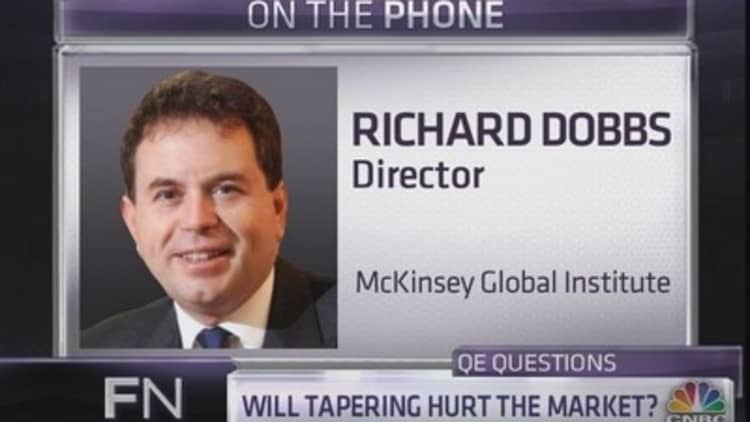
Many credit the Federal Reserve's quantitative easing program for the stock market's 25 percent rally this year, but a new research report from the McKinsey Global Institute suggests that the impact of QE on the market has been badly overblown.
Rather than looking to the low interest rates fostered by the Fed, the main author of the report, Richard Dobbs, says that stocks have rallied on the back of stronger corporate fundamentals.
"The market is not being driven up by QE," Dobbs said on Thursday's episode of "Futures Now." "The reason the market's up is that profits are up and that cash levels are up in companies."
Dobbs, who is the London-based director of the McKinsey Global Institute, said that the market has been fooled by the short-term reactions to QE-related news.
"If you look at the announcements of QE programs ending or being continued, you do get short-term movements," Dobbs acknowledged. "But if you look at the following week, those moves get unwound. So we're not seeing the short-term thing sustaining."
(Read more: For Fed Chair Yellen, it was a perfect hearing)
But what of the oft-made argument that by squashing interest rates, the Fed's QE program leads investors to exit bonds and seek out a higher return in stocks?
In the Wednesday report, entitled "QE and ultra-low interest rates: Distributional effects and risks," Dobbs and his co-authors write that this rationale only makes sense "if investors see equity investment as a true substitute for fixed-income investment. There are reasons to believe that this is not the case. For example, equity markets have been highly volatile since the start of the crisis, which in all likelihood should persuade many fixed-income investors to avoid investing in these markets."
Stocks and bonds, then, are not perfect substitutes, and it doesn't appear that investors have sold the one to buy the other.
After all, Dobbs asks, if the recent rally is largely due to investors being forced to buy stocks, then wouldn't we see valuation metrics move much higher?
"We started off by thinking that we wanted to be able to show how QE and ultra-low interest rates have actually boosted the equity markets. The trouble is, when we actually look at the fundamental valuations, as measured by things like the price-to-earnings ratio and the market-to-book ratio, the market's in line with its 50-year average," Dobbs said.
(Read more: The deceptively simple reason stocks won't quit)
Yet while Dobbs says that the long-term impacts of QE have been badly overstated, he says that short-term traders can keep acting like the Fed is the main driver behind the market.
"If you're a day trader, you can make money by betting ahead of [Fed announcements] on the short-term movement," Dobbs said. "So I don't think they're necessarily wrong in terms of one day. Just do the trade, make the money and get out."
—By CNBC's Alex Rosenberg. Follow him on Twitter: @CNBCAlex.
Watch "Futures Now" Tuesdays and Thursdays at 1 p.m. ET exclusively on FuturesNow.CNBC.com!
Like us on Facebook! Facebook.com/CNBCFuturesNow.
Follow us on Twitter! @CNBCFuturesNow.



